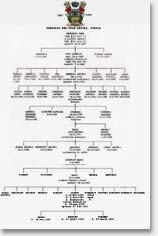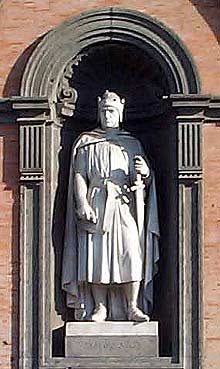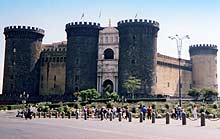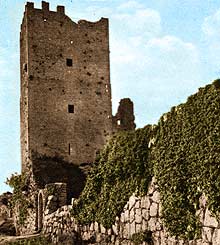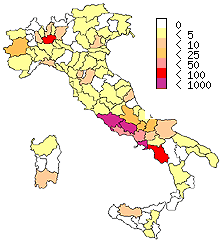
| Arpino & its people |
| Old town of Arpino |
| Reas of Italy |
| Reas Spain & France |
| Reas of Britain |
| Reas around the world |
| Conclusion |
| Further links |
| Home |
Reas of ItalySo where did the REA surname originate from? Can we rely on church records to be 100% proof of the origin of one’s surname? Who were its first bearers, where did they settle, which tribes did they belong to, if any? Are we the descendants of the pre-hellenic Greek colonists, the local Volscian people, or their conquerors the Samnites, and later the Romans?
Over the past years I have been researching with great interest the origin of our ancestors, researching my own tree as far back as the 1600s. Research places the Rea surname in different locations around Europe. The origin of my own ancestors is Italian as far as I can go back; our history starts in the hamlet of Civitavecchia in the town of Arpino, where the surname REA, and to a lesser extent REALE, are the most popular surnames. There are many suggestions as to where this surname came from before this; is it just a coincidence or are the REAS of Italy related to the REAS in Spain, France, England, Scotland, Ireland and elsewhere? One intriguing possibility is that we may be descended from Angevin knights. The Angevin dynasty spanned from southern Italy and the borders of Scotland. The Angevin armies were fighting the Crusades, and on their return from the Holy Land, some knights were employed as mercenaries by local principalities in Italy. In the pay of noble families, they fought their battles and helped train their armies. As a reward, they received titles, and land and property where they eventually settled. Evidence to this are the many castles in this region. The name 'REY' is of French Angevin origin; could it be that knights with this surname were the root of similar names in Italy, Spain, England and Scotland? I do know that many Italian emigrants left their beloved homeland in search of a better life during the 19th and 20th centuries. It was in this period that my own grandfather Marco Rea left his mountain village with his brother Antonio Rea for England. There were many REAS that left Arpino and settled within the British Isles. Some settled in France and further still America, Canada, Australia, and even South America. We must all be from the same family tree going back, since we all came from Arpino, or other nearby hamlets. Italian surnames originate from many sources. For example, those of Northern and Southern Italy and Sicilia include Arabic, Norman, French (Angevin), Austrian, and Spanish. In medieval times, surnames were often patronymics based on the father’s personal name preceded by ‘di’ ‘(son) of’, such as Lorenzo di Giovanni (Lorenzo son of Giovanni), although names of saints or religious figures could also be used. They could also be toponyms referring to a person’s place of origin either in the form Antonio Pisano (Antonio the Pisan) or Antonio da Pisa (Antonio from Pisa). Elements derived from professions or personal characteristics are also found. The prefixes ‘la’ or ‘lo’ (‘the’) were often attached to nicknames. In the 19th century they were often used to mean ‘from the family of’ and it was quite fashionable to add them to one's surname. In my opinion REA derives from RE, meaning King, or REALE and REALI meaning Royal. It can also mean culprit i.e REO meaning male culprit, or REA meaning female culprit. It is also derived from the place of residence of the original bearer, in this case the name signifies ‘one from Rea’ a town located in Pavia, in northern Italy. Variants of the surname REA include RE, REALE, REALI, REO, SCHIREA, REANO, BOREA, COREA, REAVALDA, and other small surnames include RIA, REI, REU, and RET. REA especially when found in Lombardy and Emilia Romagna, is taken from the classical name ‘REA SILVIA’, the vestal priestess who was the legendary mother of Romulus and Remus. There is also a REA coat of arms that comes from Sicily. There are over 542 families in the Frosinone region alone with this surname REA, not taking into account the whole of Lazio and Campania. In Arpino there are 210 REA families. In the city of Sora close to Arpino there are 80 families with the surname REA, and scattered in nearly all the provincial towns and villages that come under the control of Frosinone one finds the REA surname present in large numbers. This surname is one of the most popular surnames in the province of Frosinone, Lazio, and Campania. One can say it is truly a southern Italian surname because all Italian surnames end in vowel. If an Italian surname does not, it is of foreign origin.
|
|
